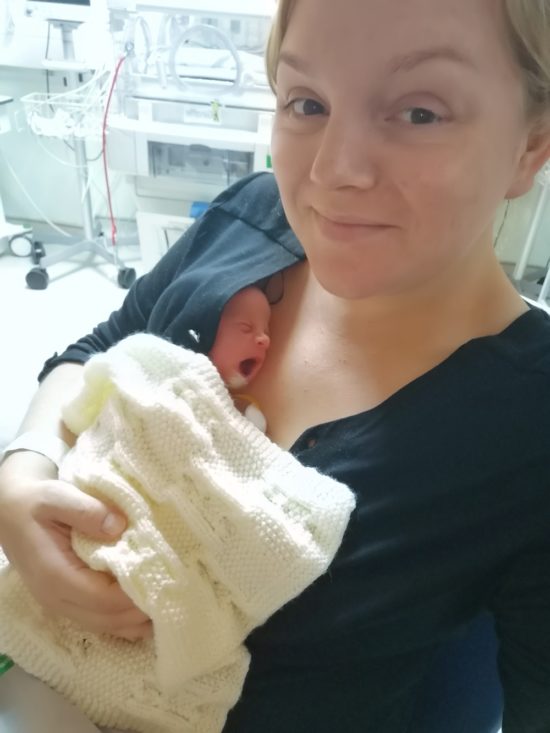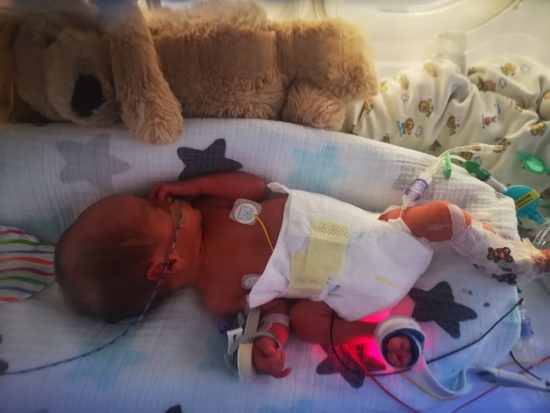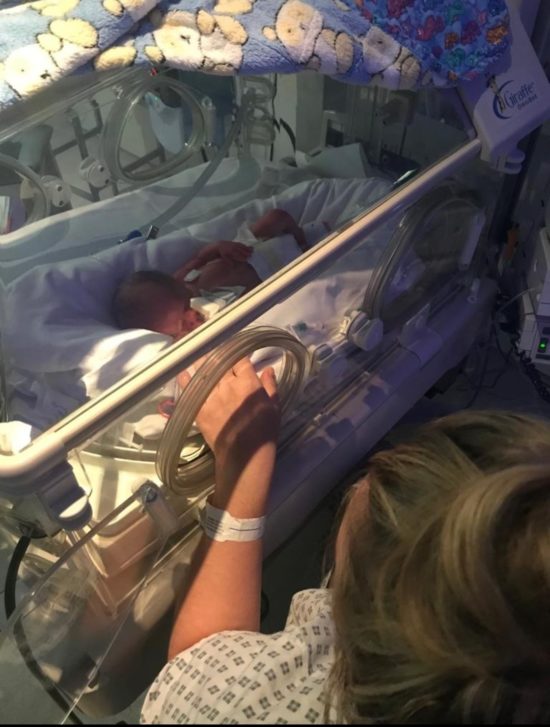One in 13 babies is born premature in the UK, and will spend time in the neonatal intensive care unit (NICU). We spoke to Dr Frankie Harrison, a clinical psychologist who works with parents after their NICU experience. Her own baby was born prematurely at 31 weeks due to severe preeclampsia.

I qualified as a clinical psychologist in 2016. I previously worked on inpatient units and did training across the lifespan, in different settings.
I then had my baby prematurely in 2019 and since then have worked with other parents who have been through neonatal care, supporting them psychologically through 1:1 therapy sessions, group therapy, courses and free online support @miraclemoonuk on Instagram and Facebook.
My first son was born at 31 weeks due to severe preeclampsia. I was admitted to hospital to reduce my blood pressure, which initially worked, but over a couple of weeks, my blood pressure kept increasing and my organs started to fail. Therefore he was born by emergency caesarean section at 31 weeks, on the day that I was supposed to attend my first NCT class!

We spent 5 weeks in neonatal care and had support with his breathing, feeding and temperature control. It wasn’t until I was home, that I realised that I needed further support in processing my experience.
I reached out to local NHS services and realised that the support wasn’t there. It is often a postcode lottery with regards to the support available for parents who have been through NICU.
I therefore started looking online, talking about my experience, applying my knowledge of psychology and coping skills.
I met another mum called Georgie, who was a graphic designer and had her baby at 31 weeks too.
We teamed up and developed @miraclemoonuk which is an online support page on Instagram on Facebook to provide free help to other parents who have been through NICU. I speak about common feelings and how to manage them, as well as spreading awareness.
I currently provide online therapy support, group therapy and courses and also provide a lot of free material so that people can feel supported in their experience after NICU.
That it can happen and that talking about it, will not make it more likely to happen, but it will help you to feel a little more prepared.

The majority of people I speak to wish they had known that it existed, that it is a place that is separate to your maternity unit, where babies may need to go if they need extra medical support.
There are so many things I wish that people knew, which is what I talk about on social media often.
The main thing I would want people to know, is that it is OK to feel however you feel in the experience, it is OK to be anxious, sad, jealous, resentful… it is normal to feel a lot of feelings on the unit and when you come home.
It is also OK to reach out for support and there are so many parents who have been there too who are waiting to support you when you are ready.
Parents often report feelings of grief for missed moments and shattered expectations of how they wanted pregnancy, birth and entry into parenthood to look.
They talk about feeling guilt about somehow ‘failing’ at being pregnant or giving birth. NICU can leave you with trauma, anxieties and depression, which can have a psychological impact on you once home.
If you feel like you are impacted by your NICU stay, it is important to reach out for support, you do not have to be ‘over it’ within a certain time frame, but it doesn’t have to impact your everyday life.
Be there. Offer support, contact, a listening ear, you don’t have to know what to say, all you have to do is be present, keep checking in, offer them space to talk if they need it or want it.
You can also do practical things to support them, like looking after their pet, offering to support their other children, cook for them, clean for them, offer them lifts to and from the hospital.
Know that the emotions may not kick in until they are home, so giving them space to talk about it when they are home is important too.
Respect the fact that they may want to protect their baby from germs, so either let them know if you have a cold and give them the choice as to whether they see you, wash your hands when you are near them, only hold the baby if they offer.
We have a free resource with a lot of ideas for how to support parents in NICU on our website.
You can find free online support @miraclemoonuk on Facebook and Instagram.
Our NCT courses help parents think about the unexpected situations that might happen and what their feelings and needs might be in those circumstances. Our practitioners also work to help parents develop understanding and connection with their group so they have that network of peer support that becomes even more important when a baby is poorly or needs medical help after birth.
Bliss is a charity for babies who are born premature or sick. Find out about how they can provide practical and emotional support on their website here. We spoke to them about having a premature baby.
Tommy’s campaigns to end preventable baby loss, and provides support for babies lost during pregnancy, birth or shortly afterwards.